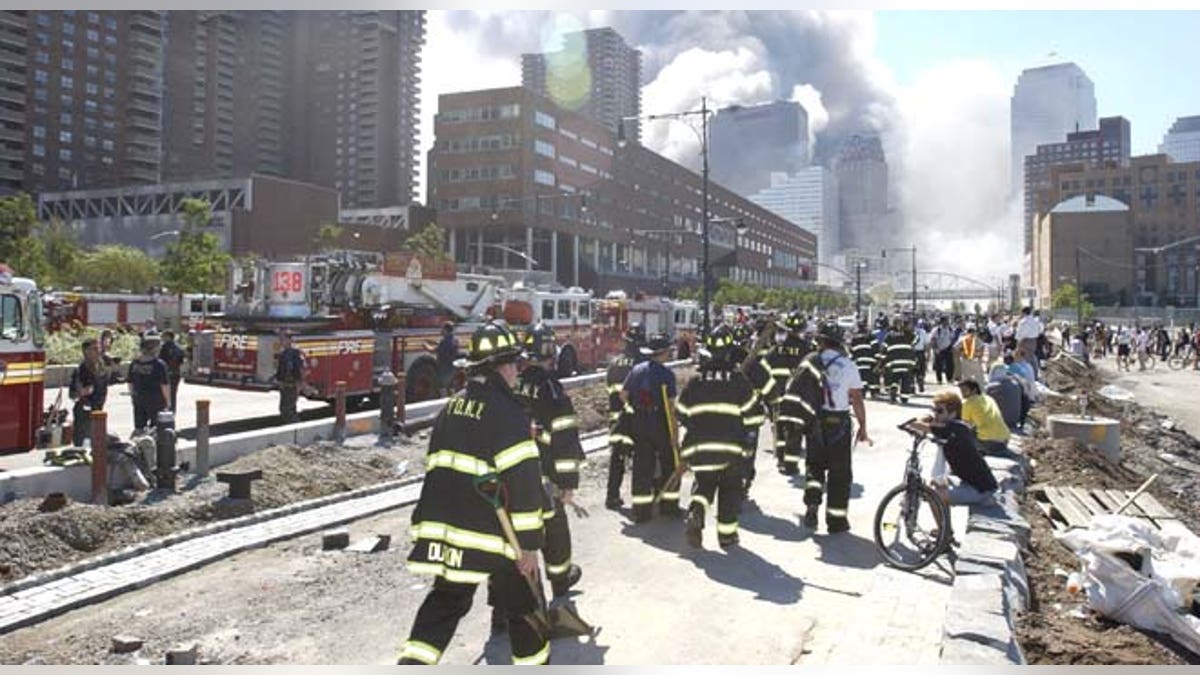
Fireman heading south on the West Side Highway towards the remains of the World Trade Center where smoke continued hours after the colapse. Streets of lower Manhattan with fireman, police, and rescue crews after the colapse of the World Trade Center after being hit by two airplanes on September 11, 2001. photo by Gabe Palacio/ImageDirect
Their collective heroism has been well documented, becoming in the last decade the standard by which true courage is measured. The valor of the first responders of September 11, the men and women who carried out their ordinary jobs under the most extraordinary circumstances, will never be forgotten – not on this 10th anniversary, the 11th, the 20th or beyond.
But for those who knew the individuals prior to that culmination of courage, their legacy took shape long before that pivotal day. To those loved ones, the firefighters, police officers and emergency medical technicians were already heroes – for volunteering at the local basketball league, taking the kids to soccer practice, or performing their everyday duties. When the entire world wasn’t watching, they were heroes to the person who felt safer on a street corner because of their presence, to the family who was plucked from a burning building, or to the son or daughter whose parent was brought back to life in the back of an ambulance.
Take Ramón Suárez, the New York Police Department transit police officer who was captured by a newspaper photographer helping a soot-covered woman flee one of the towers, a lasting image that embodied the first responders’ sacrifice that day. The picture and accompanying story in Newsday hanged for years in the NYPD’s public information office at One Police Plaza.
The 45-year-old father of three and grandfather once saw a group of teenagers beating a man in his Ridgewood neighborhood, according to an account his wife, Carmen, gave to the New York Times. He held the troublemakers until a patrol car came by.
So when friends saw the photo, they weren’t surprised that Suárez, after bringing the woman to safety, reportedly rushed back to the chaos to save more lives.
“It just shows that he was truly a hero,” Valerie Ortiz, a friend and neighbor, told Newsday just a few weeks after the attacks, when Suárez’s remains still hadn’t been recovered. “Like we already knew that he is.”
Then there’s Mario Santoro, an emergency medical technician who was one of the first emergency personnel to arrive at the scene.
Santoro, who was 28 and is survived by, among others, his wife and daughter, devoted his Saturday mornings to a basketball league on Manhattan’s Lower East Side. He coached pre-teens and teenage boys and, for a few hours each weekend, connected with many of the kids in a way perhaps their parents and teachers couldn’t.
Among the dozens, perhaps hundreds, of boys to come in contact with Santoro over the years was a boy named Al. In the late 1990s and 2000, Al’s tenacious defense and scowl on the court was a window into his no-nonsense personality and hard edge off it. For all his adolescent bravado, though, Al listened to Santoro’s every word on the hardwood and outside the lines.
After the attacks, Al received the league’s inaugural Mario Santoro award in 2002. Eight years later, Al – the same tough boy who viewed outsiders warily – returned to the league as a young man and a graduate of Syracuse University.
“I’ll never forget Mario,” Al told a mutual friend and a former coach then. “He helped me out a lot.”
Heroism manifests itself in subtle ways. For Yamel Josefina Merino, perhaps the journey to becoming an EMT – the young mom dropped out of high school before getting her general equivalency diploma and landing a job in the field – had as much of an impression on her 8-year-old son than the courage she displayed that day. Indeed, the 24-year-old emergency responder worked the scene at the World Trade Center until the South Tower came crashing down a little after 10 a.m.
But even before that, the doting single mother, who reportedly wanted to study to become a nurse, set an example of hard work and perseverance for her boy, Kevin Villas. Today, the young man is a high school graduate and is studying writing at a local college, according to the Journal News in Westchester, New York.
“My mother, after 9/11, even before 9/11, was a really loved person,” Villas, now 18, told the newspaper. “Nobody wants that child to go off in the wrong direction.
“In a sense, I am representing my mother in a way,” he added. “I am what’s left of my mother. I make a point, for lack of a better word, to impress people, to show them that I’m going on the right path.”
Dennis Mojica had been a hero for a lifetime. The 50-year-old fire lieutenant, who served six years with the U.S. Navy, gave 29 years of his life to the Fire Department of New York.
“It was his dream, it was his life, it was his first love,” his fiancée, Maria Barreto, told the New York Times. “I admired him even more because he knew what he was here for in this life. He really knew.”
She described Mojica as giving his all to everything he did: to his profession, to romance and to being a father to his then-teenage daughter. It was no surprise, then, that he gave his all to saving lives on September 11.
“The rescuers at the World Trade Center made the ultimate sacrifice,” Ed Federkeil, a fire lieutenant in Florida who was friends with Mojica and another firefighter, Dana Hannon, told the Miami Herald just two weeks after the attacks. “Their actions in this tragedy did not amaze me. They acted exactly how I knew they would.”
Wil Cruz can be reached at wil.cruz@foxnewslatino.com.
Follow us on twitter.com/foxnewslatino
Like us at facebook.com/foxnewslatino








































